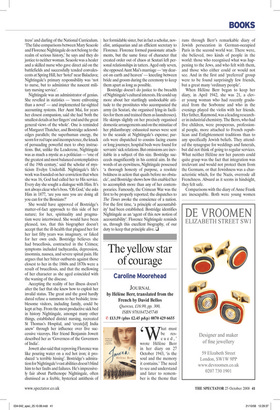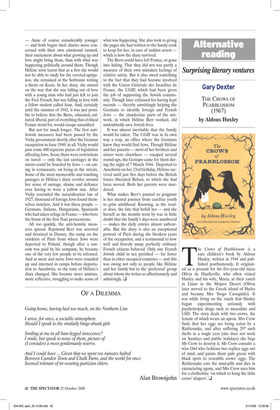The yellow star of courage
Caroline Moorehead
JOURNAL by H├®l├©ne Berr, translated from the French by David Bellos Quercus, ┬Ż16.99, pp. 300, ISBN 9781847245748 Ō£å ┬Ż13.59 (plus ┬Ż2.45 p&p) 0870 429 6655 ŌĆśWhat must be resc u e d , ŌĆÖ wrote H├®l├©ne Berr in her diary on 27 October 1943, ŌĆśis the soul and the memory it contains.ŌĆÖ The need to see and understand and later to remember is the theme that runs through BerrŌĆÖs remarkable diary of Jewish persecution in German-occupied Paris in the second world war. There were, she believed, two kinds of people in the world: those who recognised what was happening to the Jews, and who felt with them, and those who either could or would not see. And in the first and ŌĆśpreferredŌĆÖ group were to be found surprisingly few friends, but a great many ŌĆśordinary peopleŌĆÖ.
When H├®l├©ne Berr began to keep her diary, in April 1942, she was 21, a clever young woman who had recently graduated from the Sorbonne and who in the evenings played the violin with her friends. Her father, Raymond, was a leading researcher in industrial chemistry. The Berrs, who had five children, were prosperous, professional people, more attached to French republican and Enlightenment traditions than to any specifically Jewish beliefs. They attended the synagogue for weddings and funerals, but did not think of going to regular services. What neither H├®l├©ne nor her parents could quite grasp was the fact that integration was irrelevant and would not protect them from the Germans, or that Jewishness was a characteristic which, for the Nazis, overrode all Frenchness. Absurd as it seems in hindsight, they felt safe.
Comparisons with the diary of Anne Frank are inescapable. Both were young women ŌĆö Anne of course considerably younger ŌĆö and both began their diaries more concerned with their own emotional turmoil, their excitement about what growing up and love might bring them, than with what was happening politically around them. Though H├®l├©ne soon learnt that as a Jew she would not be able to study for the coveted agr├®gation, she remained at the Sorbonne writing a thesis on Keats. In her diary, she mused on the way that she was falling out of love with a young man who had just left to join the Free French, but was falling in love with a fellow student called Jean. And, certainly until the summer of 1942, it was just possible to believe that the Berrs, educated, cultured, liberal, part of everything that civilised France stood for, would escape unscathed.
But not for much longer. The first antiJewish measures had been passed by the Vichy government shortly after the German occupation in June 1940: in all, Vichy would pass some 400 separate pieces of legislation affecting Jews. Soon, there were restrictions on travel ŌĆö only the last carriages in the metro could be boarded by Jews ŌĆö on eating in restaurants, on being in the streets. Some of the most memorable and touching passages in H├®l├©neŌĆÖs diary revolve around her sense of outrage, shame and defiance over having to wear a yellow star. After Vichy rescinded the naturalisation law of 1927, thousand of foreign Jews found themselves stateless. And it was these people ŌĆö Germans, Italians, Hungarians, Spaniards who had taken refuge in France ŌĆö who bore the brunt of the first Nazi persecutions.
All too quickly, the anti-Semitic measures spread. Raymond Berr was arrested and detained in Drancy, the camp on the outskirts of Paris from where Jews were deported to Poland, though after a ransom was paid by his company, he became one of the very few people to be released. And as more and more Jews were rounded up and interned in camps before deportation to Auschwitz, so the tone of H├®l├©neŌĆÖs diary changed. She became more anxious, more reflective, struggling to make sense of what was happening. She also took to giving the pages she had written to the family cook to keep for her, in case of sudden arrest ŌĆö which is how the diary survived.
The Berrs could have left France, or gone into hiding. That they did not was partly a measure of their own mistaken feelings of relative safety. But it also owed something to the fact that they had become involved with the Union G├®n├®rale des Israelites de France, the UGIF, which had been given the job of supporting the Jewish community. Though later criticised for having kept records ŌĆö thereby unwittingly helping the Germans to identify foreign and French Jews ŌĆö the clandestine parts of the network, in which H├®l├©ne Berr worked, did undoubtedly save Jewish lives.
It was almost inevitable that the family would be taken. The UGIF was in its own way a trap, an office where the Germans knew they would find Jews. Though H├®l├©ne and her parents ŌĆö most of her brothers and sisters were elsewhere ŌĆö escaped several round-ups, the Gestapo came for them during the night of 7 March 1944. Deported to Auschwitz on her 23rd birthday, H├®l├©ne survived until just five days before the British forces liberated Belsen, to which she had been moved. Both her parents were murdered.
What makes BerrŌĆÖs journal so poignant is her mental journey from carefree youth to grim adulthood. Knowing, as the reader does, the fate that befell her ŌĆö and she herself as the months went by was in little doubt that the familyŌĆÖs days were numbered ŌĆö makes the daily entries almost unbearable. But the diary is also an exceptional portrait of Paris during the bleakest years of the occupation, and a testimonial to how well and bravely many perfectly ordinary French citizens behaved. Only one French Jewish child in ten perished ŌĆö far fewer than in other occupied countries ŌĆö and this was owing not only to people like H├®l├©ne and her family but to the ŌĆśpreferredŌĆÖ group about whom she writes so affectionately and admiringly. ŌØæ



















































































 Previous page
Previous page